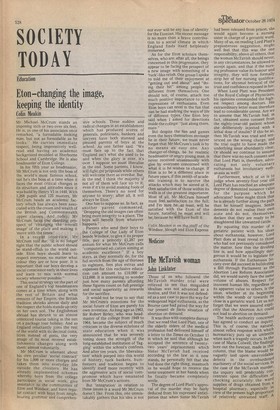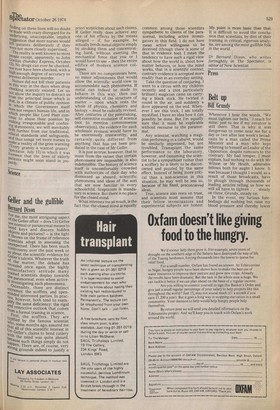Medicine
The McTavish woman
Juin Linklater
Those of us who followed the McTavish murder trial were relieved to see that misguided idealism was not advanced as a motive, and that it was not defended as a test case to pave the way for widespread legal euthanasia, as the Bourne case had paved the way for our present de facto situation of abortion on demand.
It was thus with complete dismay that we read that Lord Platt, one of the elderly elders of the medical profession had delivered himself of a letter to the Times on October 11 in which he said that although he accepted the sentence of twentytwo years' imprisonment which Sister McTavish had received according to the law as it now stands, he personally felt that she had done the right thing, inasmuch as he would hope to receive the same treatment at her hands when he finally became completely senile.
The degree of Lord Platt's approval of the murder may be fairly deduced from his expressed anticipation that when Sister McTavish
had been released from prison, she would again become a nursing sister in charge of a geriatric ward. Many of us, on reading Lord Platt's preposterous suggestion, might well feel that this was the one responsibility, above all others, that the woman McTavish should never, in any circumstances, be allowed to accept again, and that if the nursing profession value its honour and integrity, they will now formally strip her of her nursing qualifications, for abysmal betrayal of the trust and confidence reposed in her. When Lord Platt was President of the Royal College of Physicians, his opinions commanded the highest respect among doctors. His extraordinary letter must therefore lead to considerable unrest. Are we to assume that McTavish had, in fact, obtained some consent fromri the eighty-year-old patient whom she deliberately injected with a lethal dose of insulin? If this be so, then McTavish was tried and sentenced on the wrong charge, and ths trial ought to have made the underlying issue abundantly clear. Or should we continue to assume that there was no such consent and that Lord Platt is, therefore, advocating not only voluntary euthanasia but involuntary euthanasia as well? Furthermore, which of us is to judge when seventy-four year old Lord Platt has reached an adequate degree of demented nuisance value for the purpose which he advocates? Some might think that he is already further along the path than he himself imagines. Senile dements do not realise their own state and do not, themselves, declare that they are ready to be slaughtered like unwanted cattle.
By equating this murder of a geriatric patient with his ideas about euthanasia, however, Lord Platt does at least reveal to those who had not previously considered the matter, how thin the dividing line is, and how appallingly dangerous it would be to legislate for euthanasia. If the Euthanasia Society ever did succeed in bulldozing a Bill through Parliament as the Abortion Law Reform Association did, we would surely face the same volume of abuses. Respect for innocent human life, regardless of its apparent value to others, is the issue, whether at its beginning within the womb or towards its close in a geriatric ward. Let us not forget that we were assured explicitly that the Abortion Act could not lead to abortion on demand. The health authority concerned has agreed to conduct an inquirYThis is, of course, the natural, almost reflex response with which bureaucracy puts up an umbrella when such a tragedy occurs. In the case of Maria Colwell, the findings bore out the forecast, made in this column, that the blame would he vaguely laid upon unavoidable defects in the overburdened machinery of the social services. In the case of the McTavish murder, the inquiry will predictably concentrate upon the difficulties 0,f checking accurately the vvaru supplies of drugs obtained frorn a hospital pharmacy, especially in view of the present high proportion of relatively untrained staff. A finding on these lines will no doubt be made with crazy disregard for its underlying, unacceptable, implicit snggestion that more nurses would kill patients deliberately if they were not more closely supervised. The reality is well known to most People except, apparently, to John Gordon (Sunday Express, October 13). No drugs can ever be checked, for ever have been checked, with a high enough degree of accuracy to Prevent deliberate murder. • Nurses did not kill their patients in this way in the days when drug Checking scarcely existed. Let us not allow the inquiry to distract us trunl the principal issue which is that, in a climate of public opinion In which the Government itself does not respect human life, and in Which people like Lord Platt continue to abuse their position by Making irresponsible and confusing statements, we will inevitably drift further from our traditional, ethical standards and safeguards, and thus tempt yet more nurses to rnake a reality of the grim warning Every granny a wanted granny', 9ectator, July 13) in which it was foreseen that the lives of elderly Patients might soon stand in jeopardy.











































 Previous page
Previous page